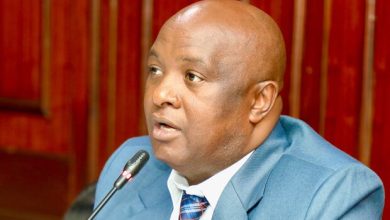Moses Kuria Calls for Arrest of Uasin Gishu County Official

Moses Kuria, former Cabinet Secretary, and current Senior Advisor to the government has called for the arrest of Chief Health Officer at Uasin Gishu County, Joyce Sang after she ordered county hospitals to begin charging patients seeking services at the county hospitals.
In an X social media post, Kuria wrote, “Another candidate for jail.”
Patients in Uasin Gishu County are now being asked to pay for medical services out of pocket, despite having been covered under the National Health Insurance Fund (NHIF), as the transition to the new Social Health Insurance Fund (SHIF) continues to unravel.
The county’s health facilities, totalling 192, have been directed to begin charging patients, leaving thousands of residents scrambling to meet medical expenses they thought were already covered.
Uasin Gishu Governor Jonathan Bii Chelilim driving a tractor.
Photo
Jonathan Bii
Joyce Sang, the Director of Health Services in Uasin Gishu, issued the directive, making it clear that patients who were once NHIF beneficiaries must now pay cash for services. “The transition is ongoing,” Sang noted in a letter made public on October 3 by Moses Kuria.
The situation has further stoked the flames of public outcry over the government’s handling of the health scheme shift.
Uasin Gishu becomes the second county to enforce such measures, following Meru County’s announcement earlier this week. The confusion and uncertainty sparked by the change from NHIF to SHIF have left many Kenyans wondering how they will access crucial medical services.
Patients who once relied on the NHIF to cover essential treatments such as dialysis have found themselves paying hefty sums, some for procedures they can barely afford.
The shift to SHIF has been anything but smooth. Patients across the country are experiencing delays as hospitals struggle to process approvals under the new scheme. Some hospitals have turned patients away entirely, exacerbating fears that the national government’s decision to implement SHIF without sufficient preparation will leave the most vulnerable citizens in the lurch.
The move to replace NHIF with SHIF has been criticised not only by the public but also by the Council of Governors (COG), which claims the national government sidelined them in the transition process. Muthomi Njuki, Tharaka Nithi Governor and chairperson of the COG Health Committee, revealed that none of the counties had signed an Intergovernmental Participatory Agreement (IPA) with the implementation authority. Yet, county governments manage most of the country’s health facilities, creating a standoff between county and national authorities.
Private and faith-based hospitals have also weighed in, raising red flags over the new contracts they are being asked to sign. The Rural and Urban Private Hospitals Association of Kenya (RUPHA) and various religious health facilities argue that the government is not addressing their concerns about the Ksh.21 billion debt owed to them by the now-defunct NHIF.
These facilities have refused to sign new agreements with SHIF, claiming that the terms are designed to push them out of the healthcare system and leave patients without adequate options for treatment.
This wave of frustration and resistance across the healthcare sector paints a grim picture of the current state of medical services in Kenya. Kenyans who are already struggling to make ends meet now face a potentially crippling financial burden for basic healthcare services. The growing rift between the national government, county governments, and healthcare providers only adds to the confusion.
Health CS Dr Deborah Barasa, with PS Mary Muthoni and Director General Dr Patrick Amoth, inspecting key health facilities, including KNH, to evaluate preparedness for the Mpox outbreak, Monday, August 19.
Photo
MoH



